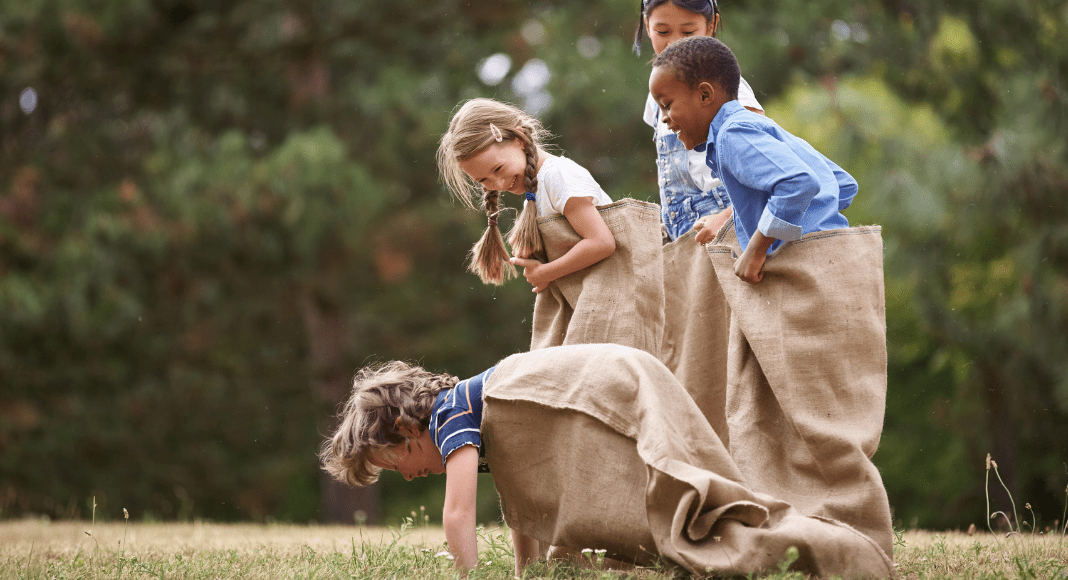 I stand in the playground parking lot with my inconsolable four-year-old. My shirt sleeve is a web of snot and drool, a gift from the blubbering daughter perched on my hip and draped over my shoulder. She did not fall. She is not scared. She lost… And I love this. I love that she hates to lose. This eighth child is the product of two first-born parents and seven older siblings. Her survival is all about competition, and, gasp, it’s healthy.
I stand in the playground parking lot with my inconsolable four-year-old. My shirt sleeve is a web of snot and drool, a gift from the blubbering daughter perched on my hip and draped over my shoulder. She did not fall. She is not scared. She lost… And I love this. I love that she hates to lose. This eighth child is the product of two first-born parents and seven older siblings. Her survival is all about competition, and, gasp, it’s healthy.
Many caregivers and teachers work to eliminate competition—unnecessary pressure, stress, and disappointment top the list of reasons why many choose to avoid it. But though competition may create opportunities for failure, that is precisely the reason we work so hard to encourage it.
Competition is a means of self-reflection.
What can I do better next time? How can I improve the outcome? Even though I “won,” how can I grow? Competition spurs our best effort. Without it, what is left to rouse our desire to obtain anything but mediocrity? Sure, competition is easy when our children land on the winning team, the top of their class, or the Homecoming court, but what happens when they do not? Resilience. Perseverance. Tenacity. Grit. That’s what happens. Perceived failure or even literal loss prepares children for losses later in life. Someday, our adult child will not get the promotion. Eventually, she will experience a brutal breakup. Competition in childhood allows us to practice coping mechanisms before the stakes are too high. We are empathetic because we, too, have encountered challenges.
In our house, we hate getting beat, but losing is intolerable.
Stay clear of the kitchen table on Scrabble night. All of us face better opponents; other people are smarter, quicker, and stronger. That is okay. Sometimes, we simply get beat. We put forth our best effort and our best attitude, and someone else does it better. We can live with that. We can accept the setback without diminishing our self-esteem. But losing means not only did we not win, but we did not learn. We did not give our best effort. We did not maintain a healthy attitude. That is the true failure.
Competition also illustrates how the “best” may not always be the “winners.”
Hard work and stick-with-it-ness often lead to greater success than raw, natural talent. Our family has witnessed dozens of children who, early on, were naturally bigger, faster, stronger, and wiser. But because they never played the “underdog” role, they never learned to compete, persevere, or recover. And almost every one of those children left their sport, club, or team by the time others caught up to them.
Competition teaches us that hard work yields result in the long run, and it helps us practice patience in a world of instant gratification.
We learn to control our nerves better. We develop goal-setting strategies and discover the importance of follow-through. But here’s the coolest part. It works. With a large family, I have the distinct advantage of watching my children grow and fail and learn with such consistency and longevity that we are growing and failing and learning better with each one… It is like having one kid with seven mulligans. We now have three adult children who were never the biggest. They were never the fastest. They were never the smartest. They simply worked the hardest. And their work ethic and grit afforded them free college educations. They “won” because they persevered, and that started early.
So, yeah, this feisty, teary, raging preschooler is really mad she lost. She lost a race to her sister on the playground and is furious because she wants to be better. Competition is not forced on her. It isn’t ruling over her childhood like a mandatory right of passage or some cruel preparation for adulthood. It is part of her inner workings that she explores, not fears. Heck, yes, we encourage it. We celebrate it, even. Because we want our kids to work hard for something. There are so many intrinsic, natural rewards in doing so. No participation trophies are needed here.








